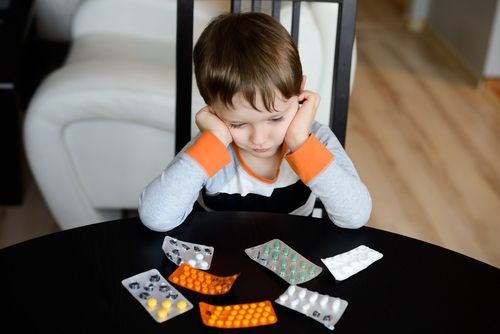Saliva Test May Predict Teen Boys' Depression Risk: Is Childhood Mental Illness Overdiagnosed And Overtreated?

The pressure to fit in at school, family life, and sexual orientation, are common stressors during a child’s teenage years. Teen angst accompanied by hormone havoc can easily lead to mood swings with constant changes — emotional, mental, and physical — happening in their lives. According to a recent study, a new biomarker may predict depression risk in teen boys, but are adolescents really experiencing depression, or are they just simply irritable or unhappy?
Depression Diagnosis in Adolescents: Is It Too Early to Tell?
By age 18, 11 percent of adolescents have a depressive disorder, says the National Institute of Mental Health, with girls more susceptible to experiencing depression than boys. However, this statistic raises the question of whether childhood mental illnesses like depression are being overdiagnosed and overtreated. Former chair of the Diagnostic and Statistical Manual of Mental Disorders (DSM-IV) Task Force, Dr. Allen Frances, believes the rise in mental illness is due to a fad or the need to explain or label something that would otherwise be described as unexplainable human suffering and deviance, he wrote in Psychology Today. He questions if anyone would get through life without a mental disorder.
Depression Guidelines: Can DSM Lead to Overdiagnosis?
During the release of DSM-III in 1980, more copies of the manual were sold to the general public than to doctors, providing them with self-knowledge, early identification, and treatment. The manual affected psychological diagnostics, including the public’s perception of mental disorders, as autism, attention deficit hyperactivity disorder (ADHD), and anorexia, among others, were introduced for the first time. At the time, there was limited scientific research to back up the DSM-III claims, which meant many mental conditions were written in a vague matter, possibly leading to overdiagnosis.
Depression in the 21 Century: How Self-Diagnosis Can Lead to Overdiagnosis
In the digital age, the Internet, although a powerful communication tool, has also contributed to the recent psychiatric fads or epidemics. Typically, websites that focus on specific disorders — often created by the patient themselves, or their families — appear alluring to those who self-diagnose and look to be a part of an online community. The danger of this trend is that the fads have occurred in childhood disorders, and most mental health issues start before age 24.
Spit Test for Depression: First Biomarker May Accurately Assess Mental Illness Risk
Children who feel sad, disappointed, or unhappy may quickly be labeled as depressed, although there are no current medical tests to prove someone is suffering from depression. A team of researchers at the University of Cambridge, devised a saliva test that may reveal those who are at risk of lifelong mental illness and revolutionize depression treatment. The spit test — is the first biomarker that may predict depression — by analyzing teens’ cortisol “stress hormone” levels along with any depressive symptoms, The Associated Press reported. Stress has often been linked with depression risk because high cortisol levels can reduce serotonin and other neurotransmitters in the brain, such as dopamine, linked to depression. The study found teenage boys with mild symptoms of depression and high cortisol levels had a 14-fold major depression risk, while only a fourfold depression risk existed for teen girls with similar symptoms.
Depression and Drugs: Overdiagnosis and Overtreated
While it seems like researchers are making efforts to establish accurate, medical tests to diagnose depression, the overdiagnosis and overtreatment problem may lie within the guidelines on diagnosing depression, as Frances previously suggested. In the 1980s, qualifying symptoms for depression included: feeling sad, "blue," or "down in the dumps" for two weeks, or appetite change, inability to sleep, tiredness, and a drop in libido. These symptoms were all too common that many people were diagnosed with depression at one point in their lives.
The DSM-V manual has not made any changes regarding its core criteria of symptoms for major depression or the requisite two-week time period needed before it can be diagnosed, despite acknowledging that major depressive disorder is commonly diagnosed. Patients usually self-diagnose symptoms and report them to their doctor who then offers anti-depressant medication.
Selective serotonin reuptake inhibitors (SSRIs) are commonly prescribed for depression symptoms because they block the reabsorption, or reuptake, of serotonin in the brain, says the Mayo Clinic. SSRIs change the balance of serotonin helping the brain send and receive messages, which boosts mood, and counter feelings of depression. However, the effectiveness of SSRIs has been questioned by studies that show placebos seem to have just as powerful an effect on mild to moderate cases of depression. The overtreatment of depression may lead to a dependency on these drugs that could possibly not even help treat the mental disorder.
It is important to accurately assess people for depression, especially children, who will most likely take antidepressants throughout their life. Parents should remember that sometimes when their child is sad, maybe they are just sad, not depressed. Teens often display signs of moodiness and difficulty, which is why it’s vital to distinguish between teen angst and depression.



























